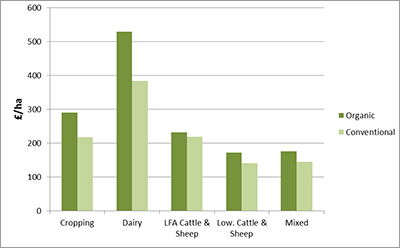
This detailed financial report on organic farming in England and Wales for 2014/15, undertaken by the Organic Research Centre for the Welsh Government, highlights that the organic dairy industry is now generating higher profits than conventional farms despite producing lower yields. The sector is also successfully competing for new export business in countries like China and USA.
Over the period of the report the average organic milk yield was 6228 litres per cow, which is lower than the average conventional holding yield of 7485 litres per cow. However this was compensated by lower forage costs and an organic milk price increase to 38ppl; compared to the reduced conventional price of 30ppl (pence per litre), resulting in an organic net margin of £376 per cow (6ppl) compared with £298/cow (4ppl) conventional.
These results indicate that organic dairy farm income was above conventional levels in 2014/15. Although yields are lower, reduced input costs on items such as fertiliser and machinery together with receiving a premium price for organic milk means that the organic sector has become more resilient in a challenging market.
Professor Nic Lampkin from the Organic Research Centre in Newbury and one of the co-authors of the report explains, “There has been a considerable recovery in the organic market since the start of the recession. In the last couple of years the organic movement has witnessed growth in many areas and this is evidenced in an increasing demand for organic products from consumers as well as a rise in the range of organic products which are now more widely available.
According to The Soil Association’s 2016 Market Report, the organic market continued to experience steady growth of 4.9% in 2015. This is the third year of consecutive growth for the UK organic sector, now worth £1.95 billion. Sales of organic products have continued to outperform the non-organic grocery market which decreased by 0.9% in the same period.
Animal welfare has also been a key motivator to consumers who are increasingly choosing organic products because they want to know the origins of their food, and are willing to pay more for products with quality assurance standards. Organic farming is perceived as being better for the environment and wildlife as well as providing a better quality of life for farmed animals.
Nic Lampkin said that the report also showed that the organic sector was more likely to benefit from support payments through Government Agri-Environment schemes, not only the support for organic production. He said, “Organic farms are far more engaged in production methods that are better for the environment. Restricted pesticide inputs, and more diverse crop rotations contribute to greater diversity and to natural weed, pest and disease control. These are all seen as important reasons for the financial support given to the organic sector.”
This annual report, produced by the Organic Research Centre, a partner in Organic Centre Wales, is now funded by the Welsh Government. Nic Lampkin says, “We have been monitoring the performance and profitability of the organic sector in England and Wales for the past 20 years and even in difficult market conditions, the organic sector has managed to maintain its position. However, although numbers fell during the recession, organic farming in England and Wales has stabilised, with fewer farmers withdrawing from the sector and new converters coming on board.
The analysis of 2014/15 data showed that organic farms achieved higher or similar profitability to comparable conventional farms, and on organic LFA (less favoured area) cattle & sheep farms profitability was statistically higher than conventional farms. At the enterprise level, organic dairying net margins were above the conventional level, whilst for beef and sheep enterprises, organic margins were ahead of the conventional sector. Cropping enterprises also showed a positive position for most organic activities, and therefore it can be concluded that with the addition of support payments, organic farms are performing at a similar or better level than comparable conventional farms.
To download previous Organic Farm Income reports, please visit: http://tinyurl.com/OFIreports
The Organic Research Centre (ORC), established in 1980, is the UK’s leading independent research centre for the development of organic/agroecological food production and land management solutions to key global issues including climate change, soil and biodiversity conservation, and food security.
Posted in News and events, Press Releases, Research